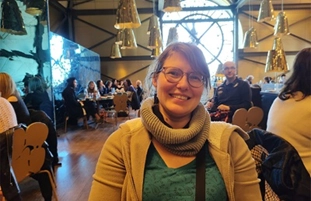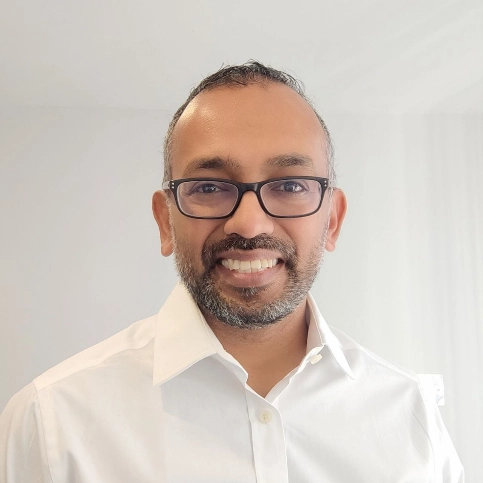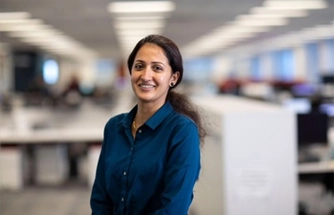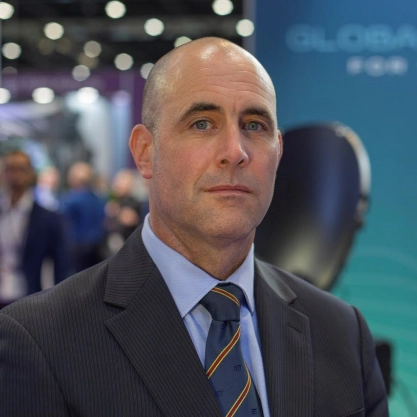For over 30 years, ST Engineering iDirect has been a driving force in transforming the economics, technologies, and business models that have expanded satellite communications around the world. Today, our teams continue to push the boundaries of technical innovation, leading the way to new opportunities for our customers to connect people, businesses and communities – no matter where.
To celebrate #NationalSTEMDay, we sat down with just a few of the company’s STEM professionals to learn more about the work they do, their career paths and what advice they would give to young people who have an interest in STEM and satellite communications.
Kim – Director of Engineering, Quality and Release Engineering
 Can you tell us about your position in Engineering?
Can you tell us about your position in Engineering?
I’ve been with the company nearly ten years, starting with Newtec as a Validation Engineer in 2012.
For about the last six years I’ve been QRE Operations Coordinator and Release Manager. The Quality Team gets the software from the development teams for validation and testing. We examine the documentation and requirements to start our validation campaign from there.
We identify issues and investigate together with the other teams how to improve quality before it goes to the customer. So, every product passes through our team for testing before it goes to customers.
I started as a tester, but now I’m primarily involved in planning and operations. For all our different products we need to make sure we have the right resources in place.
How did you get interested in STEM as a career?
In Belgium at about 14 years of age you have to choose a track of main courses to follow — languages, economics, science, and math. Languages were never my cup of tea, but I really liked math and science and pursued that. I always found electronics quite interesting. And after the science and math track in secondary school I pursued a Master’s in Engineering with a focus on electronics.
What part of your work do you find most exciting?
Releasing an advanced, high-quality product to our customers gives me great satisfaction. I always enjoy the moment when we can proudly say that a product release is ready to go to customers.
I also appreciate that ST Engineering iDirect is a very innovative engineering company. New technologies are allowed to be fostered here, which is fantastic.
What’s your advice for young people considering a career in Science, Technology, Engineering and Mathematics (STEM)?
If it’s truly interesting to you, it doesn’t matter how hard it is, go for it. I had a niece who was afraid of math. She thought the math was going to be too hard. But she had a lot of passion and she studied hard and she’s now a Site Manager of Restoration and Renovation.
So don’t listen to anyone who says you’re not smart enough. If it’s what you really want to do, you will find a way to make it happen.
Rajesh – Senior Director, Business Development

Inquisitiveness. As a kid, I was always inquisitive about how things work, which led me to often take household items apart and re-assemble them (much to my dad’s annoyance). This curiosity eventually led to a fascination with computers and electronics. I eventually went on to do a degree in Electronics and Telecommunications Engineering and spent the first 10 years designing, implementing, and managing telecoms network infrastructure and systems. This helped me develop a good understanding of the operational and organizational dynamics of these companies and eventually me transitioning into roles in Product Management, Strategy and Business Development within the tech sector.
What’s the most exciting project you’ve worked on?
That’s a really difficult question… I am spoilt for choice! Each project was unique and came with its own set of challenges, deadlines, and successes. What really excited me was the opportunity to learn something new from people much smarter than me, coming up with potential solutions and applying my own learnings into solving those problems. I believe that this is something that drives me even today.
What advice would you have for a student who wants to pursue a career in STEM?
There are various misconceptions about what a career in STEM will lead to, however in my opinion, the fundamentals will equip you with analytical and problem-solving skills, and transferable learnings that you can apply across multiple disciplines. So, don’t be fixed on following a set career path at an early stage. The rapid technological transformations of the 21st century mean that the opportunities are limitless. 5G, Web3.0, the metaverse and AI will power the next iteration of the internet and we are already starting to see the innovations and opportunities that opened because of that. Pursuing a career in STEM will equip you with skills needed for the future.
What do you love about working at ST Engineering iDirect in your role in Business Development?
There’s never a dull day and no day is ever the same here at iDirect. The best part though, is in working with a diverse set of colleagues and partners and seeing our technology and innovations having a direct beneficial impact on governments, businesses, communities, and users around the world.
Swetha – Senior Manager Engineering, Project & Portfolio Management

I have an older sister who’s an engineer. And most of my cousins are engineers as well, so I had a lot of exposure to the field early on.
I started as a developer, writing code in C/C++ for almost nine years. I worked with ST Engineering iDirect as a contractor back in 2009 and joined the company fulltime in 2014.
A year later I decided I wanted to broaden my experience beyond coding and moved to project management, managing Waterfall and Agile deliverables and releases. Later I was offered a management position. Today I manage a talented team of 10.
What are your main priorities today, and what’s your favorite aspect of your job?
There are several. I work on engineering initiatives needed for overall engineering … regarding Jira, KPIs and metrics for instance. That’s one part.
I’m the project manager for a very cool, high-profile project: Microsoft Azure.
I’d have to say the part of my job I find most enjoyable is coaching and mentoring my team, and the one-on-one sessions with my team members. For me, it’s all about working with my team to solve very complex challenges in a fast-paced environment.
How was the transition from independent contributor to manager for you?
My years of experience as a developer and scrum master has been invaluable. Naturally, a manger role requires interaction with many different groups, so there are different challenges. When I talk to engineers, for example, it’s much easier for me to understand their feedback and their point of view because I have been in their shoes.
What advice would you give to young women considering a career in STEM?
It’s not easy, but if your heart is in it, just go for it. Don’t overthink it, move ahead.
I think it’s also very important to not only invest in understanding the product and the technology, but invest in understanding what the company does, and what value it offers to customers.
You must also develop your soft skills – stepping up and taking things up, volunteering and expanding yourself from that aspect other than just coding.
Dave – Technical Director, Global Government

I wasn’t particularly academic at school and the choices were either the local dockyard, or the military. I went into the Army careers office looking to join the infantry, or cavalry, but after taking the assessment tests was streamed into a technical apprentice route. The military is very good at identifying talent and they were right; I did have the aptitude for a STEM career, but my style of learning was better suited at a practical, rather than academic approach. I never looked back and soon specialized in radio communications, followed by satellite communications.
What advice would you have for a student who wants to pursue a career in STEM?
Speak to as many people as you can to get advice on the options. Also, try to identify how you best learn. Then, choose a route that suits your learning style. I’d suggest that there are four main routes: university degree, apprenticeship, a hybrid degree-apprenticeship, or the military. These may change from region to region, so do your homework and explore what’s out there and what works for you; all are equally valid routes and when you’re in the middle part of your career you’ll find that all routes will lead to roughly the same point.
What does it take to be successful in a STEM career?
A passion to learn, apply knowledge and a natural inquisitiveness all help, but for me the main thing is a desire to improve the solutions for the people using them. Also, I can’t emphasize the importance of networking enough; a lot of the time, I may not know the answer, but I know who to ask, or where to look. Building a network of positive, helpful people is key. I’ve found mentoring really helps too; a good mentor will challenge you and suggest options for you to explore. Mentoring others also reminds me of the principles and things to focus on myself.
What’s the most exciting part of your job?
Every day in a STEM career is different, but my favorite parts are when you see your input paying off, either in terms of equipment you’ve supplied on the ground helping people or seeing people you’ve mentored achieving great things.